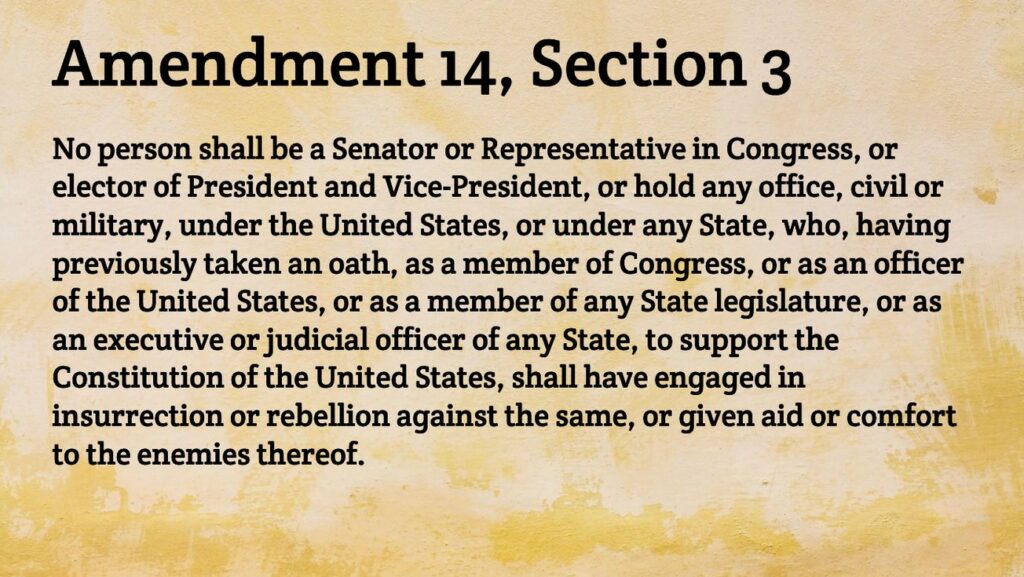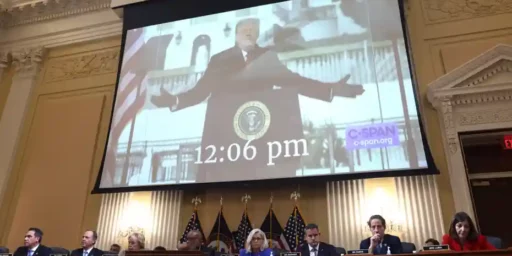Trump Ballot Eligibility Ruling Could Come Today
If so, he'll almost surely win bigly.

AP (“A Supreme Court decision could come Monday in a case about barring Trump from the 2024 ballot“):
A Supreme Court decision could come as soon as Monday in the case about whether former President Donald Trump can be kicked off the ballot over his efforts to undo his defeat in the 2020 election.
Trump is challenging a groundbreaking decision by the Colorado Supreme Court that said he is disqualified from being president again and ineligible for the state’s primary, which is Tuesday.
The resolution of the case on Monday, a day before Super Tuesday contests in 16 states, would remove uncertainty about whether votes for Trump, the leading Republican candidate for president, will ultimately count. Both sides had requested fast work by the court, which heard arguments less than a month ago, on Feb. 8,
The Colorado court was the first to invoke a post-Civil War constitutional provision aimed at preventing those who “engaged in insurrection” from holding office. Trump also has since been barred from primary ballot in Illinois and Maine, though both decisions, along with Colorado’s, are on hold pending the outcome of the Supreme Court case.
The Supreme Court has until now never ruled on the provision, Section 3 of the 14th amendment.
The court indicated Sunday there will be at least one case decided Monday, adhering to its custom of not saying which one. But it also departed from its usual practice in some respects, heightening the expectation that it’s the Trump ballot case that will be handed down.
Except for when the end of the term nears in late June, the court almost always issues decisions on days when the justices are scheduled to take the bench. But the next scheduled court day isn’t until March 15. And apart from during the coronavirus pandemic when the court was closed, the justices almost always read summaries of their opinions in the courtroom. They won’t be there Monday.
Any opinions will post on the court’s website beginning just after 10 a.m. EST Monday.
WaPo (“Supreme Court to post a decision Monday, possibly on Trump ballot access“) adds:
The Supreme Court is set to announce at least one opinion Monday morning, leading to speculation the justices could rule on Donald Trump’s eligibility for the Colorado ballot the day before Super Tuesday — when presidential primary elections are held in that state and more than a dozen others.
The high court took the unusual step Sunday of scheduling an opinion announcement for a day when it is not in session. The justices typically issue rulings from the bench, with the author of the majority opinion presenting a summary of the court’s decision. Instead, the court said opinions could be posted on its website Monday at 10 a.m.
[…]
With the primary season looming, the Supreme Court fast-tracked the case, one of several on the docket this term that will impact Trump’s political and legal future.
After oral argument on Feb. 8, it seemed likely that a broad majority of the court would decide to keep Trump on the ballot. Justices from across the ideological spectrum warned of troubling political ramifications if they did not reverse the Colorado ruling. Several justices suggested that a state court ruling initiated by voters in one state to bar him from federal office would throw the presidential race into extreme disarray.
It’s interesting that major outlets are so sure that this is the ruling that’s coming today but the reasoning tracks. Not only are they releasing an opinion two weeks earlier than they otherwise would but they sent out announcement on a Sunday night to alert the press.
As the linked 8 February WaPo report on the oral arguments (“Supreme Court poised to allow Trump to remain on Colorado ballot“) makes clear, pretty much every single Justice who asked questions during oral arguments displayed profound skepticism of the Colorado ruling.
Justices from across the ideological spectrum warned of troubling political ramifications if they do not reverse a ruling from Colorado’s top court that ordered Trump off the ballot after finding that he engaged in insurrection around the Jan. 6, 2021, assault on the U.S. Capitol.
[…]
During more than two hours of argument, the justices asked questions that suggested their often divided benchcould reach a unanimous or near-unanimous decision to reject the challenge to Trump’s eligibility brought by six Colorado voters. Not since the court’s 2000 ruling in Bush v. Gore, which focused on ballot-counting and sealed the election for President George W. Bush,has the Supreme Court been thrust into such a pivotal role in a presidential election.
Liberal Justice Elena Kagan repeatedly questioned whether one state should be allowed to decide whether a presidential candidate is disqualified. “Why should a single state have the ability to make this determination not only for their own citizens but for the rest of the nation?” she asked, adding, “That seems quite extraordinary, doesn’t it?”
Conservative Justice Amy Coney Barrett agreed, adding that “it just doesn’t seem like a state call.”
Trump is quickly closing in on the GOP nomination, and several justices suggested that a state court ruling initiated by voters in one state to bar him from federal office would throw the presidential race into extreme disarray.
Chief Justice John G. Roberts Jr. predicted that a number of other states would quickly try to disqualify the leading Democratic candidate if the justices allowed the Colorado decision to stand. He called the prospect of a handful of states deciding the presidential election a “pretty daunting consequence.”
Justice Brett M. Kavanaugh worried about disenfranchising voters if the court removed Trump from the ballot. “What about the idea that we should think about democracy, think about the right of the people to elect candidates of their choice, of letting the people decide?” he asked.
The consequentialist arguments are powerful but odd. Either states have the right under the 14th Amendment to keep insurrectionists off the ballot or they don’t. And, while I’ve been skeptical of whether they do, absent criminal conviction, this is a powerful rejoinder:
In response, attorney Jason Murray, representing the Colorado voters, said, “The reason we’re here is that President Trump tried to disenfranchise 80 million Americans who voted against him, and the Constitution doesn’t require that he be given another chance.”
And this line of reasoning strikes me as just odd:
A divided Colorado Supreme Court disagreed and barred Trump from the ballot, prompting his appeal to the Supreme Court. Maine’s secretary of state reached the same conclusion, but her decision is also on hold.
Much of the discussion Thursday centered on differing interpretations of the text and history of the 14th Amendment provision, also known as the disqualification clause, which was initially intended to stop former Confederates from returning to power after the Civil War.
Conservative Justice Clarence Thomas and liberal Justice Ketanji Brown Jackson — who have clashedon the most divisive issues before the court — both expressed deep skepticism of the Colorado voters’ view of the scope of the 14th Amendment. They agreed with Roberts’s assessment that the post-Civil War amendment was aimed at limiting the power of the states.
And yet, Roberts said, the Colorado voters seeking to remove Trump from the ballot appear to be trying to use the same amendment to say states have the power to prevent candidates from running for nationwide office.
“That seems to be a position that is at war with the whole thrust of the 14th Amendment and very ahistorical,” Roberts said.
To the extent that Section 3 is live and not just a vestigial remnant of the immediate aftermath of the Civil War (and I believe it’s the former), that doesn’t make much sense. In the immediate case, it was the states who were in insurrection against the Union. But the ban (which was ironically lifted rather quickly for Civil War leaders) was clearly aimed at individual insurrectionists.
I’m even more skeptical of the other argument that the Justices seem to be buying:
A majority of justices seemed ready to embrace the argument of Trump’s attorney, Jonathan Mitchell, who said enforcement of the disqualification clause is up to Congress, not state courts or officials. In addition, Mitchell said Section 3 does not apply to Trump because the president is not an “officer of the United States,” which is one of the terms the section uses when discussing potential insurrectionists.
Jackson seemed to share his doubts about whether Section 3 applies to former presidents because it is not one of the government positions specifically listed in the text.
“You have a list and president is not on it,” she emphasized.
Kagan, however, pressed Mitchell about why the framers would have left out the highest office in the land. What reason would they have had, she asked, for saying an insurrectionist cannot hold the “whole panoply of offices in the United States, but we’re perfectly fine with that insurrectionist being president?”
Mitchell acknowledged that it “does seem odd that President Trump would fall through the cracks,” but said the text represents a compromise. He insisted “officer” means an appointed official, not the elected president.
The notion that the President isn’t an officer of the United States seems absurd. The arguments for that position are strained, indeed.
Regardless, this case is more politically charged than most, and the Justices clearly recognize that:
Derek Muller, a University of Notre Dame law professor who has been closely following the case, said Thursday’s arguments showed both liberals and conservatives on the court are “uncomfortable with the notion that it was going to be the decider here.”
“The court does not want to be in the business of cleaning up ballot access disputes for presidential candidates in perpetuity,” Muller said.
Unlike the divided ruling in Bush v. Gore, which polarized the nation, Muller said a unanimous or close to unanimous decision might be more widely accepted by the public.
“Maybe it’ll be more palatable to people to say, ‘Listen, we really expect the political process to solve this, rather than expecting litigation to answer the question.’”
If the oral arguments are any indication, we’re likely to get a ruling that’s unanimous or at least very close.





If they do leave him on the ballot, unless they rule he didn’t commit insurrection, which seems absurd, they’re just kicking the can down the road, just like all our other institutions have. And maybe the voters will save them, but otherwise, there’s going to be a massive amount of litigation over whether he’s a duly elected president.
Never before has one man wreaked so much legal havoc. Trump has moved beyond branding to a revolutionary new product for the legal profession: Cases of First Impression. (As to Kagan’s bewilderment over one state being able to decide a presidential election….see Bush v. Gore.)
So much for originalism.
That isn’t to say that 14A, sec. 3 is necessarily good law, but its original meaning is plain.
Talk about burying the lede!
It is wonderful to hear that the Chief Justice of the Supreme Court is now in favor of removing the Electoral College!
@Charley in Cleveland: OK, a trivial aside, but kudos, and an upvote, for proper use of “wreaked” havoc.
Amazing how quickly the Court can move when it’s time to help Trump, and how slowly when he might get hurt.
It’s the same as it’s been since Pelosi, reluctantly, started the first impeachment. Except for the people riding his coattails for personal gain or their own agendas, everyone remotely “establishment” wants Trump gone, but nobody has the stones to do anything about it. John Roberts could save the Republic, but he won’t.
We’ve all known since it came out that SCOTUS would kill the CO decision. The only suspense has been how they’ll weasel word around the clear vernacular meaning of 14-3. Will it be:
– It was only a small, clumsy insurrection.
– He hasn’t been charged with “insurrection” per se.
– He hasn’t been convicted (and we’re going to help him delay to keep it that way).
– The holder of the Office of President isn’t an officer.
– It isn’t up to the states to do it (and we won’t).
– Whatever it says, it’s really only about the Civil War.
– Disallowing Trump would somehow be an unacceptable restriction on democracy, unlike, say, disallowing Arnold Schwarzenegger.
– As in 2000, blah, blah, present circumstances only, blah, blah.
– Some entirely new and creative originalist bullshit.
Speaking of 2000, note that whatever they do it’ll be two for two in favor of Republicans. Reflecting either, or both, the Court’s bias or the propensity of GOPs to skirt the law.
He’s on the ballot! 9-0
@becca: I see I @gVOR10: beat the announcement by about one minute. I haven’t seen yet what BS excuse they used.
WAPO says it’s one I missed on my list:
– Congress, which is incapable of passing a budget, must act first.
I hope whatever deal the three “liberals” made to make it unanimous is worth it. That they went along with this lowers my already negligible respect for the Court.
I’m awaiting the full opinion, or rather analysis of the opinion, but the gist I’ve gathered so far is that it’s Congress that must decide to enforce the constitution and disqualify a candidate for federal office.
I’d bet a substantial amount at least one GQP in the House will introduce a resolution to disqualify Biden. On the grounds that “doing things I don’t like,” constitutes insurrection. They’ve already impeached Mayorkas on similar grounds.
Also, wasn’t there a prospective presidential candidate who is not elegible because he’s a naturalized citizen? He should sue to be allowed on the ballot. See if any other qualifications in the Constitution need to pass Congressional muster.
@Kathy: You can read the opinion here:
https://www.supremecourt.gov/opinions/23pdf/23-719_19m2.pdf
I have to say, my opinion of every justice quoted above went down. These are the finest legal minds in the country!? Jesus Haploid Christ.
Andrew Fleischmann has a solid tl;dr take on the substance of the decision:
From: https://x.com/ASFleischman/status/1764669024556732776?s=20
The bottom line is that a rapist and criminal conman got himself elected to the presidency, aided and abetted by an adversarial foreign power and a corrupt political party and threw the world for a loop. And the same bad actors are trying to get this piece of sh!t back in to finish us off.
“I haven’t seen yet what BS excuse they used.”
Limits on states rights, per the 13th, 14th and 15th amendments.
WTFU
I’ve read the decision, and I think the reasoning is solid.
I agree, however, with the liberal justice concurrence that the majority went further than it needed to and further than should have by saying that legislation is required – it was enough for the court to simply say that states don’t have the authority and leave it there.
@Andy:
If I were in Congress, I’d draft a law right now allowing states to determine whether a candidate the states deem to violate section 3 of the 14th amendment can or not run for any federal office.
I know, it has less of a chance of ever passing, as I do of winning every lottery in the world this month without buying any tickets.
@Andy:
I’m not surprised by the 9-0 ruling that states lack the authority. I was surprised that there was a 5-4 majority that took the federal courts out of it as well, saying that only Congress can make the determination.
@Kathy:
Not only would it be unlikely to pass but the Supremes would likely invoke their new “major questions” doctrine and hold that Congress can’t delegate the power even if they wanted to.
@Kathy:
That would be a stupid law. The whole idea of giving each state a veto for candidates for federal office is just bad.
Instead, Congress could just pass a law defining what is and isn’t covered under section 3, similar to how Congress defined the scope of the “natural born citizen” clause.
You may remember the dumb attempts to get McCain disqualified for being born in Panama, and the birther nonsense. Well, that’s the can of worms you open up if you allow any state or even jurisdiction to define for themselves – and the country – what the standard for disqualification is under section 3.
@Michael Cain:
The problem is who do you want to be the primary body that decides the scope and limits of Section 3 – the legislature or the courts? We already have a problem in the country of a single federal judge being able to declare a nationwide injunction – that’s not something I’d like to see when it comes to ballot access for Presidential candidates.
@Paul L.: Do you have an opinion on this topic, instead of an off-topic thread derail?
@Andy: That it needs to be decided federally – I can buy that. That only Congress can do it? Nah. How about seeking an injunction in Federal Court?
@Andy:
I’m not sure I agree because the follow up question to that answer is “well then, who does.” My atrophying inner conservative might have enjoyed a chuckle at the irony of subsequently hearing liberals lamenting “unelected jurists” usurping the rights of the several states to run elections–as mandated in the Constitution–though.
@Paul L.: I’m not sure that “lose it and freak out” accurately describes what appeared to me to be a cogent (and more cogent than the hosts would agree with) point about the role of Article 5 in the amendment. Perhaps you would elaborate for me?
@Jay L Gischer:
The whole way our system is designed is for the legislature to do that, and the courts are only there to adjudicate conflicts and reign in the other branches when necessary.
Again, who do you want deciding the scope and limitation of section 3 of the 14th amendment? Do you really want the courts having all the say and Congress having none?
@Just nutha ignint cracker:
The more I think about this, the more I’m coming around to that view, which is is basically what I’m arguing to Jay.
At the end of the day, I think it is the responsibility of Congress to define the scope of Section 3. SCOTUS didn’t have to come out and say that directly though. A federal challenge would have made its way to them, and then they could have had the debate on the merits of that question, which is separate from the merits of the 9-0 decision. I think the liberal justices were upset because that process was short-circuited, and those merits likely won’t get debated, and I don’t blame them.
@Andy: Ironically enough, the Meidas Touch clip provided by friend and ally of freedom, Paul L., notes that the Supremes did exactly what you’re suggesting by noting that
ArticleSection 5 (show of hands–how many people here read thearticleamendment far enough to see that there was anArticleSection 5?) places the authority for decisions on such matters in the hands of Congress.Fat chance that modern-day Congresses are going to exercise such authority, but “whomp, there it is.”
ETA: My mistake, “Article 5” should read “Section 5.” BUT, I didn’t put my hand up for my parenthetical show of hands question. Correction entered.
@Andy:
It would be an ironic law, not a stupid one.
@Andy: “The whole way our system is designed is for the legislature to do that, and the courts are only there to adjudicate conflicts and reign in the other branches when necessary.”
Except when it comes to taking rights away from women and minorities. Then it’s all courts all the time.
@Paul L.: Thanks for the clarification. I will note in passing that my comment about the link was intended to endorse their discussion of the decision and of the court’s ruling bringing up Section 5–which has been (at least in my take) curiously omitted in discussions of the insurrection topic so far. As to the content of the commentary of the principals on the video, some of their observations were on point (usually, but not always, limited to descriptions of the ruling itself), but others were less coherent. Still in all, they (and perhaps you as well) define “lose it” and “freak out” significantly differently than I do. Then again, I’ve participated in discussions where the participants almost came to blows in the passions of the moment, and I have felt the cathartic release that comes from throwing a desk at a schoolmate. You may have no idea of what “losing it” really looks like (and I never did anything at all similar to some of the things that Luddite did–or happened to Luddite for that matter–during his high school days).
@wr:
To paraphrase*: The court giveth, the court taketh away, blessed be the name of the court.
ETA: * in honor of Brown and Roe among others.
@Paul L.:
Could you point out to me the incidences of “freaking out” and “losing it,” because I didn’t see or hear any.
And…whinny? That’s something horses do.
@Michael Cain:
Congress has a habit of abrogating responsibility for anything. The Federalist SCOTUS has been happy to step into the breach and act as a legislature. As I commented on the newer thread, SCOTUS handed Congress this hot potato knowing full well that Congress has neither the will not the ability to pick it up. SCOTUS just made the final determination while pretending they didn’t.
John Roberts and the horse he rode in on. And I’m not real happy with the three “liberals” either
@Paul L.:
I think you and I have radically different definitions of losing it and freaking out.
@Paul L.:
I don’t think I’ve ever watched Maddow, Joy Reid, Colbert, or Olbermann, etc. Sorry.
@Paul L.:
Yeah, measles are now becoming a problem in Florida, and their State Public Health Official is recommending … nothing … no quarantine of infected/afflicted children, no vaccination. He’s done everything but recommend bloodletting and leeches.
You would have prospered in the 14th 15th and 16th centuries.
@al Ameda:
Well, they’re definitely not good treatments for measles.
The problem with older viral diseases that were controlled, or nearly eradicated, through vaccination, is that they ceased to be a problem before antivirals were developed. Therefore there are no treatments for things like measles or polio.
@CSK: Yeah. I thought the same thing; which was why I suggested concrete examples of what losing it and freaking out look like in the real world.
@Paul L.:
Nope. Sorry.
@Just nutha ignint cracker:
De gustibus non est disputandum.
@CSK:
I really don’t want to comment on the troll, as that merely encourages them.
But, have you noticed they totally loose it and freak out whenever someone gets a prediction wrong? Or when data or a remedy for one thing mysteriously does not apply to a different thing?
@Paul L.:
Strangely Measles deaths were decreasing before 1963 and the vaccine being available.
SCIENCE, indeed.
Strangely, following wide dissemination of the vaccine, cases of measels and measels deathswere nearly eradicated in America.
Strangely, there was not much anti-vax opposition to measels vaccination or polio vaccination science six decades ago.